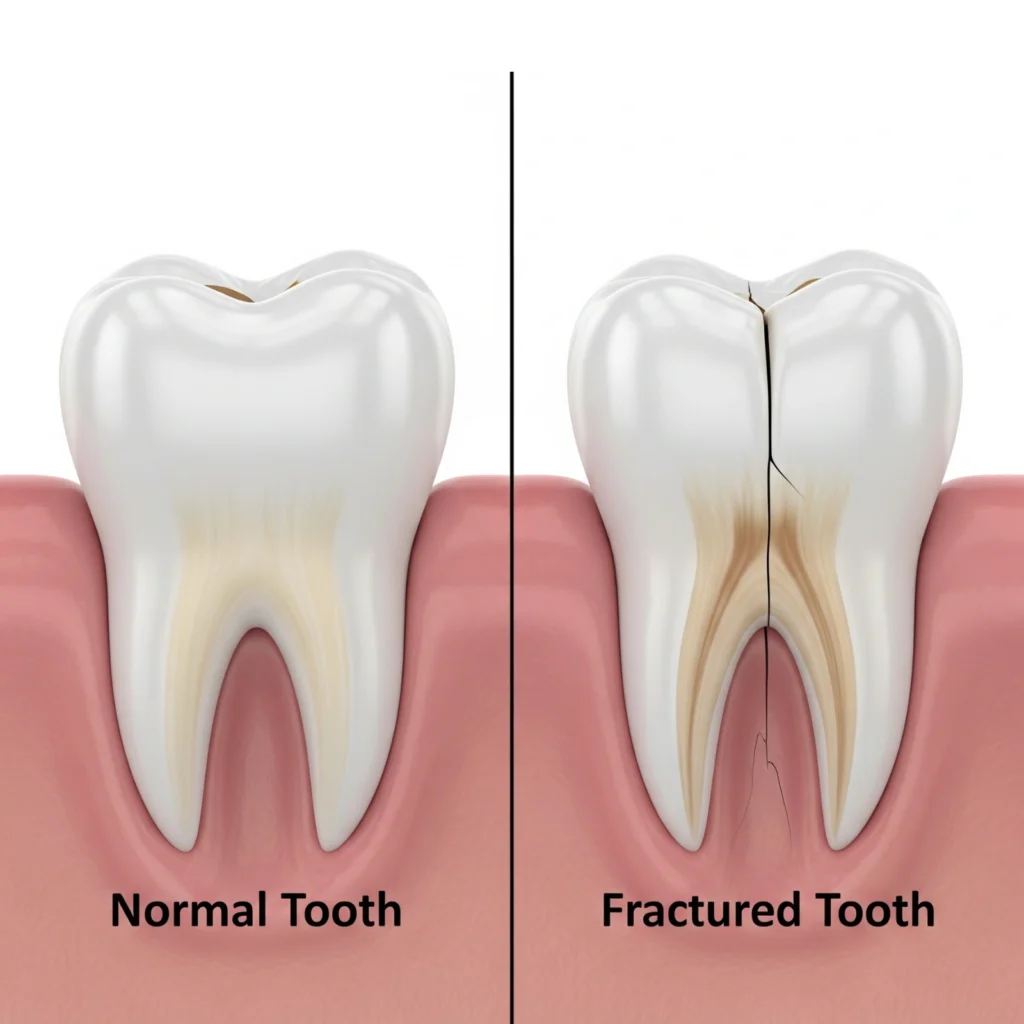A tooth fracture occurs when a crack or break develops in a tooth due to trauma, biting on hard substances, or weakened enamel. Tooth fractures vary in severity and may range from minor chips to deep cracks affecting the inner pulp. No matter how small the break, addressing a tooth fracture early is crucial for preserving both your oral health and your natural smile.
Because cracked teeth can worsen over time, early intervention is the key to avoiding discomfort and costly treatment.
Several factors can contribute to a tooth fracture, and recognizing these can help you take preventive steps.
Most common causes include:
When enamel becomes weakened due to poor habits or age-related changes, it becomes more vulnerable. Moreover, pre-existing dental conditions can increase your risk of developing cracks.
The good news is that many of these risk factors are preventable with simple, consistent care.

Identifying the signs of a tooth fracture helps you take swift action and avoid additional harm to your teeth.
Warning Signs to Look Out For:
Since symptoms can mimic those of other conditions, it’s important to visit a dentist for an accurate diagnosis.
Each type of tooth fracture demands a different approach to care, which is why prompt dental evaluation is so important.
While the damage may seem alarming, there are several effective ways to treat a tooth fracture and restore both function and appearance.
1. Dental Bonding
For minor chips and craze lines, composite resin bonding can fill in the damage and improve appearance.
2. Dental Crown
When a large part of the tooth is damaged, a crown can safeguard it and help restore its full strength.
3. Root Canal Therapy
When the crack extends into the pulp, root canal therapy can remove infected tissue and save the tooth.
4. Tooth Extraction
In cases where the fracture extends below the gum line, extraction might be the only viable solution, followed by tooth replacement options like implants or bridges.
Fortunately, modern dental advancements make these procedures highly efficient and less invasive. Early detection and prompt treatment can help save many fractured teeth.
Although accidents can’t always be avoided, there are several things you can do daily to prevent a tooth fracture from happening.
Simple Preventive Steps:
These habits not only protect your teeth from fractures but also contribute to better overall dental health.
Ignoring a tooth fracture can lead to serious complications. Cracks may deepen, allowing bacteria to enter the pulp and cause infection. As a result, untreated fractures can lead to abscesses, severe pain, and even tooth loss.
Quick action not only preserves the tooth but also lessens the chances of needing more invasive treatments later. The sooner a dentist can evaluate the problem, the better your chances of a full recovery with minimal discomfort.
If you’re dealing with pain, visible cracks, or suspect a tooth fracture, don’t delay. Timely care can make all the difference between saving or losing a tooth.
At Unidental, our skilled professionals provide accurate diagnoses, effective treatments, and compassionate care to help restore your confidence and protect your oral health.
Schedule your consultation with Unidental today and take the first step toward a stronger, healthier smile.
A tooth fracture can be alarming, but it doesn’t have to lead to permanent damage. With early detection, the right treatment, and healthy daily habits, most cracked teeth can be fully restored. By staying aware and responding promptly, you help safeguard your smile for the future.
Always remember prevention and prompt care are the best defenses against tooth damage. Let your next dental visit be the step that saves your smile.
No, a fractured tooth cannot heal naturally. Dental treatment is required to prevent worsening.
Yes, based on how severe the crack is, treatments like bonding, crowns, or a root canal can provide long-term results.
Stay away from hard, crunchy, or sticky foods, as they may worsen the fracture or heighten discomfort.
While both may feel similar, a cracked tooth often causes sharp pain when biting. A dentist can confirm the diagnosis.
Yes, especially in active kids involved in sports or those with cavities that weaken teeth.
Hyderabad : +91 6305 971445
Anantapur: +91 70758 90089
Goa: +91 83266 32500
Mon to Sat 10:00AM to 8:00PM
Sun 10:00AM to 12:00PM

Our goal is to provide friendly, caring dentistry with the highest standards in general, cosmetic, and specialist treatments. We strive to be the best dental hospital for comprehensive oral care.
We use advanced dental technology to deliver safe, precise, and painless treatments for every patient.